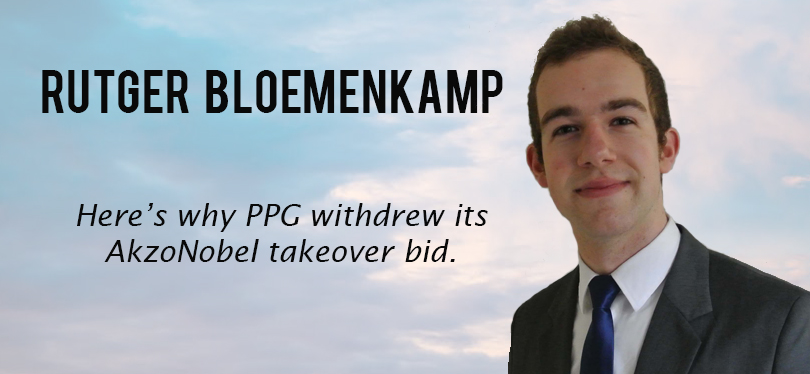From March 2017 onwards, AkzoNobel (Akzo hereafter) has been in the news, because of a takeover battle between the company and PPG, which is an equivalent company known for its paint and coatings. This resulted in many offers, lawsuits, and political debates in The Netherlands.
At the end of May 2017, the deal had a value of approximately €26.3bn, which is equivalent to €95 per share, while the share price was €74.34. Finally, PPG dropped the deal in the beginning of June, since this was the ultimate date set by Dutch law to make a final offer.
Shareholder Obligations
The main question just after PPG dropped the deal was if AkzoNobel could keep its shareholders satisfied, as the shareholders could gain quite some additional value if the company had accepted the deal. Akzo increased its performance targets, promised extra dividends to shareholders, and made promises to sell a major chemicals subsidiary to please its shareholders during the ‘takeover’ period.
Elliot Advisors (Elliot hereafter), who is one of the major shareholders in Akzo – with around 3.25% before the Akzo PPG clash, 5% just after PPG dropped the deal, and 9.5% at present – forced the company to talk with PPG. However, this aggressive approach led to a loss in the Amsterdam Enterprise Chamber.
Nevertheless, Elliot is still continuing with increasing the pressure on Akzo, as the aggressive hedge fund is demanding a special shareholders meeting, where the hedge fund hopes to fire the chairman of the supervisory board, Antony Burgmans.
The Current Situation
Currently, Elliot is forcing Akzo to have a special shareholders meeting. The major shareholder requests to fire the chairman of the supervisory board of Akzo, as he probably blocked a takeover by PPG earlier this year. Surprisingly, Akzo made a ‘smart’ move by quickly responding to the special shareholders meeting request.
As a result, Elliot is not able to put their preferences on the agenda, as the agenda filling term is already terminated. In addition, Akzo is indicating that there is no need to fire Antony Burgmans, as he is going to leave in April 2018 at latest, since this is the end of his three terms period at the supervisory board of Akzo. However, this is not a clever move at all since the management of Akzo is intentionally evading its responsibilities, according to one of Elliot’s lawyers.
That being said, it is an uncertain time for the painting and chemicals corporation. Especially, since its CEO Ton Büchner resigned last week because of health issues. Consequently, he was replaced by Thierry Vanlacker – former head of the specialty chemicals subsidiary – who only joined the company in 2016. Büchner and Burgmans promised shareholders to report better sales performance in the upcoming period; however, Q2 results missed the expectations and Vanlacker has a huge job in order to deliver on the higher sales and margin promises made before.
The following chart shows the share price movement of Akzo during recent months

6-month Akzo price movement Source: Google Finance
From the above chart, it is clearly visible that shareholders were tremendously supporting the company as soon as takeover news was published around March 2017. However, the share price declined from the moment shareholders realised that takeover chances were diminishing in April, since Akzo refused to take on serious talks with PPG. Recently, a drop in the share price occured as a likely result of the court case between Akzo and Elliot, and because Akzo’s Q2 results missed investors expectations.
Short-term Outlook
The short term is likely to feature endless conflicts between management, the supervisory board, and the shareholders. Dutch companies are famous for their stakeholder-oriented nature, which is more about value creation in the long-term and spreading its focus among the applicable stakeholders. However, this often leads to confrontations when shareholder-minded companies and investors show interest in a Dutch company.
On August 10, the Dutch court will present its rulings about the Akzo-Elliot case. Incredible changes are likely to happen if Burgmans is fired by a shareholder vote. At the moment, PPG is having a so-called cooling off period of six months, according to Dutch law, and opportunities may arise when Burgmans is fired before the end of the year.
Conclusion
In the worst-case scenario for Akzo, Burgmans is fired, Elliot further increases its stake in Akzo, and PPG forces a hostile takeover by the end of the year. However, Dutch law combined with Dutch politics may prevent this from happening.

















